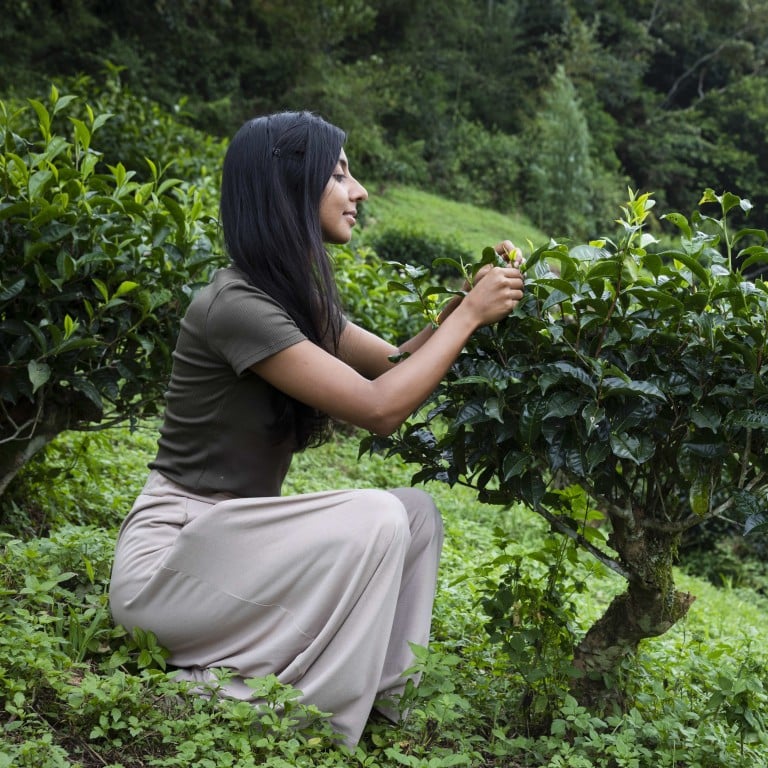Mental health awareness: how tea meditation can improve your well-being

Resham Daswani, tea curator at Hong Kong’s Fivelements Habitat, talks us through her journey of discovery – and why she believes tea meditation ceremonies can increase immunity, reduce depression and anxiety, and spread awareness about meditation
When it comes to the tea drinking culture of Asia, much has been said about the bubble tea craze, as well as the expensive teas of China, but little has been mentioned about the mental health and well-being benefits associated with drinking tea.
“Anything that connects you to harmony within and around you is enormously important in the technologically saturated world we live in today, which is why we are currently seeing more emphasis on the mechanisms to understand mental well-being and making it more central to the conversation,” says Resham Daswani, the tea curator at Hong Kong wellness centre Fivelements Habitat.
The connection between Zen and tea drinking is not new. When I first sat for a tea ceremony with Daswani, I found the movements she performs added greatly to the flavour of the tea she served – and helped with my state of mind. That one hour of silence and sipping organic, sustainably grown tea in meditation is perhaps an express version of the ways Chinese and Japanese Zen masters used to sit and ruminate over tea every day.

“In Chinese culture tea is known as the ‘emperor of all herbs’,” says Daswani. “One can begin to notice changes in one’s own life – the many tactical benefits of meditation include stronger immunity, reducing depression and anxiety, improving academic performance, reducing age-related cognitive decline, increasing happiness and quality of life, and managing and reducing trauma.
“Tea is certainly many things, from medicine to beverage to a time for connection. Tea is the second most consumed drink in the world after water, and therefore important in many cultures, so naturally there are different approaches from traditional lore to modern day appreciation.”
Daswani says her approach to tea evolved after returning to Hong Kong, following a stay at Taiwan’s Tea Sage Hut. “I began learning and steeping myself in the tea and culture of Hong Kong with a new set of eyes. I began noticing tea shops everywhere that I would have walked by a thousand times before,” she adds. “Soon I understood that for most Hongkonger’s their primary relationship with tea was through yum cha, bubble tea and a few tea-houses. More so, clean tea was thought of in a type of outdated way. I was rather surprised by this since tea is considered one of China’s greatest gifts to the world, yet it was mainly seen as commodity in Hong Kong.”
Daswani’s tea practice comes from a tea lineage that is taught by a Zen monk called Wu De, who founded the magazine Global Tea Hut and the non-profit tea centre in Miaoli, Taiwan, where all tea lovers were welcomed to come and learn about tea on a ten-day course (sadly, this centre and course have ceased for the time being, but Wu De will be making a rare trip to Hong Kong from January 15 to 18 to serve at two bowl tea ceremonies and teach all things Cha Dao, or “the way of tea”).
“I’ve always felt I did not intentionally discover this path, rather I feel tea found me,” says Daswani. “I am a big believer of the saying ‘when the student is ready, the teacher appears’ and throughout my entire life I have had this feeling, or focus to yield towards a journey of self-cultivation and to help others do the same.”
At times a tea ceremony can be quite emotional for the individual, as moments of internal truth are recognised in the present experience, which can be very wholesome
Daswani’s tea journey was definitely unexpected. Born and raised in Hong Kong, she was set on a career in fashion after graduating from London College of Fashion. “I was going to launch my own collection and although it seemed that everything was in place, from the best manufacturers to a line up of talent and media, deep down I had a voice divulging that this path and way of life was not for me.